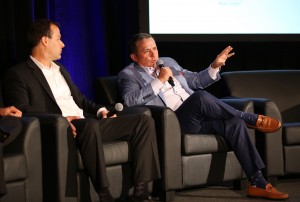“This year the human race is producing more data than the previous 5,000 years combined. Data is so powerful that in the future, nation states will fight over it for power.”
This thought-provoking statistic set the stage for a much-anticipated panel discussion at RISMedia’s 2017 Real Estate CEO Exchange in New York on how brokers are leveraging the application of predictive analytics and big data in their businesses to better serve consumers’ real estate needs.

The opening remarks, presented by panel moderator Dave Garland, partner, Second Century Ventures and director of Strategic Investments for the National Association of REALTORS®, led the way for an engaging discussion with several industry leaders on the forefront of using predictive analytics and big data in real estate to change the way their business is being conducted now and into the future.
So what is predictive analytics, and why is it so important to the real estate industry? Simply put, “Predictive analytics is analyzing extracted data, using old data to predict the future,” Garland explained. “The big difference now is we have new data points that we can apply to our industry. We’re moving from the idea of hindsight to insight to foresight.”
The idea of using data in real estate isn’t new—think tax records, comps, valuations, or even local school, business and crime statistics. But with consumers demanding more and more information, and more data being available on consumer behavior than ever before, the use of predictive analytics—being able to accurately show buyers and sellers what their home will be worth in the future, backed up by data science—is the game-changer.
“‘Big data’ sounds like it’s really far out there, but earlier today I had a meeting downtown and on my phone, it said it’s going to take me 28 minutes to get to the next place I was going, and here’s an Uber so you can get there,” said Jeremy Sicklick, co-founder and CEO of HouseCanary. “The fact that it knew where I was, where my next meeting was and what the traffic was, and linked to an Uber to get me there—that is predictive analytics. So what does that look like in real estate over time?”

San Francisco-based HouseCanary is a real estate analytics company using data science to accurately value and forecast over 18,000 U.S. zip codes, 3 million blocks and 100 million properties.
Sicklick said one of the key opportunities predictive analytics provides in real estate is having the ability to know the property value of a home, and knowing where the value is going to go, to help consumers make better home-buying and -selling decisions. HouseCanary’s home value reports also allow users to add or remove properties or property details to instantly adjust a home’s comparable value, for example, or add a bathroom or remodel the kitchen and see how that affects the home’s value.
Arming the agent with that kind of statistic-based data science is key in working with today’s real estate consumers, he said.
“When is the right time to sell my home?” Sicklick said. “We said, ‘Let’s look at the data and see what’s really happening here.’ We now have enough information to help them make those decisions. Should I improve my home, sell my home or refinance? Being able to quantify and visualize it is where big data is going. Being able to show people and arm people with the ‘why’ it’s occurring and explain it to someone who is trying to make a decision—and putting brokers and agents at the center of those decisions to help see their options—that’s the opportunity.”
Mark Choey, co-founder and CTO of the innovative boutique firm Climb Real Estate in San Francisco, emphasized the importance to brokerages of collecting data on buyers and sellers, noting the many tools available now to help the effort. “I wouldn’t recommend hiring a data scientist,” he said. “There are a lot of tools out there to help you get started.”
One of those that he uses is the Gmail extension Crystal, which uses personality detection technology to predict behavior and help businesses communicate with their clients in a more customized way, based on their personalities. Their tools use the DISC assessment, which uses four primary personality types to determine behavior: dominant, influential, steady, and calculating.
“I used the system before sending an email to someone I didn’t know, and it showed that the person likes their time respected and speaks in short, concise statements and bold language,” he said. “I wrote my email like that and got a very positive response. That’s one example of a great tool you can use to increase sales conversion.”
He also noted, “The No. 1 question people ask is, ‘Should I buy now?’ or ‘Should I sell now?’ so arming agents with data and historical context is important. When we get leads, the No. 1 thing an agent asks is, ‘Who is this lead?’ These types of new tools out there can help figure out who these people are.”
With technology innovation at his company’s core, Choey said Climb also utilizes social media data to better understand clients, and is constantly testing different tech platforms to achieve higher conversions.
“Most everyone here represents a brokerage that has been using lists for a long time,” he said. “Now we have much easier automation, more refined information, combined with good valuations. We can see if offers are coming in above or below where they should be. We can inform and say take it and run or hold off for a better offer. At any one time we’re testing out 10-15 different technologies for widgets, apps, CRMs, landing pages, different listing sources. We look at lists from CoreLogic and constantly benchmark it against our own data. Our goal is to constantly improve sales conversions and we work on it all the time.”

John Murray, managing broker and president of Rockford, Ill.-based Key Realty, echoed Choey’s support for brokerages utilizing data tools available, rather than hiring a data scientist.
“One of the core competencies of our brokerage is to help improve conversion to do more sales,” Murray said. “We have leads coming out of our eyeballs, but what do we do with them? Companies providing predictive analytics are emerging and some are better than others. If you don’t have the expertise, you can work with these companies. Some bigger shops are hiring data scientists, but the majority of brokerages should focus on how to use the data and work with these companies to improve their data—then everyone wins.”
He added, “Data is great, but it’s all about how you use that data to find out what’s important to your clients.”
Scott MacDonald, broker/owner and president of RE/MAX Gateway in Chantilly, Va., agreed, explaining the use of data in real estate, like social media data, can be effective, but only if it’s used in the right ways.
“We look at where buyers come from; we look at their profiles and know where to target our marketing,” MacDonald said. “But it’s not only knowing what to look for, but how do we use it effectively?”
MacDonald said it’s all about giving agents the best tools to use, especially given the competitive complexity of the industry today. “You have the discounters, the disruptors and the DIYers,” he said. “The more you can arm your agents with information about what happened in the past and what’s coming in the future, the better able they will be to serve their clients.”
In an industry where valuations have been called into question, Murray also commented that while the accuracy of data is paramount, so is the industry’s ability to interpret it for real estate consumers.
“It’s the utilization and interpretation of the information that we can all do in our businesses to restore some credibility to the industry—we’ve lost some of that,” Murray said. “Data is readily available and we have to be better at interpreting what it means. If we stick to being brokers and focus on customer service and restore our credibility with knowledge, it will help us recapture some of the credibility we’ve lost.”
Choey added, “There is a lot of talk about Zestimates, Redfin and realtor.com®. What we train our agents to do is take those three and bring them to a listing appointment as the basis for discussion. The challenge is consumers have all the data in the world and know everything you’re doing as an agent. Everything is out in the open. So we really try to advise agents to use the data, and help sellers and buyers analyze the data.”
Big Data Lightning Round Q&A
To close the session, Garland proposed a “lightning round” of big data questions to the panel.
What data is concealed today but will be revealed tomorrow?
Murray: Offer data
MacDonald: Instant offers
Choey: Pre-MLS, off-market data—knowing when a seller is going to sell before they sign a listing agreement
Sicklick: Really understanding days on market
What is the most important dataset for a thriving brokerage of the future?
Choey: Our agents’ happiness
MacDonald: Agent engagement. Their level of engagement is critical.
Murray: Buyer-seller propensity
Sicklick: Understanding current and past customer equity. In knowing how much equity they have, you can help them figure out what to do next.
What is the most important buyer data?
MacDonald: It goes back to price.
Murray: Buyers are looking for deals.
Sicklick: Price of property today and price at highest and best use so they understand what they are buying and what the opportunity is
Choey: Buyers want to know what the seller is going to accept.
What will be the most indispensable tool five years from now?
MacDonald: Tools that help agents communicate on a deeper level with clients about property condition. To know the value if they improve the kitchen by $50,000 or finish their basement. Tools that will help the buyer know more at a deeper level.
Murray: Workflow and tasking software that allows agents to scale in a more automated fashion.
Choey: Happiness customer score—what button can I push to make the customer happy
Sicklick: Doing our job
Sicklick offered some closing thoughts to industry leaders about the importance, and the future, of big data, not only in real estate, but in so many aspects of our daily lives.
“I get to see it through the eyes of my kids every day and how they learn. If they have a question they look it up on their iPad. They’re learning in a different way. It’s at their fingertips to search; they teach themselves. We have the first generation of people coming of age who don’t remember AOL or Prodigy. They grew up with everything at their fingertips. The way they research, buy things, get a loan, engage with people, is all really different from even 10-20 years ago. They are just going to expect it.
“How do we bring that data and capability to the next generation? This is how they want to do business. It’s just a different world now. Data is the first part of that that enables people to streamline transactions in ways we haven’t seen yet.”
Stay tuned to RISMedia for continuing coverage of this year’s CEO Exchange sessions:
- The State of Real Estate: ‘The Good, the Bad and the Ugly’
- Brokers Get Real About Standards, Succession Planning and Zillow
- Ushering in a Fresh Perspective: John Peyton and Nick Bailey Ready to ‘Blow the Dust off’ Iconic Brand
- Photo Recap: RISMedia’s 2017 Real Estate CEO Exchange
- Innovation, Not Irrelevancy: 3 Strategies to Sustain
- Are You Prepared to Handle the Top 3 Risks to Your Brokerage? (Do You Even Know What They Are?)
- Avoid ‘Chickeducks’: Team Leaders Talk Lessons Learned
- Tackling Disruption From the Inside Out
- Know Your Model, Work It Well
Beth McGuire is RISMedia’s online managing editor. Email her your real estate news ideas at beth@rismedia.com.
For the latest real estate news and trends, bookmark RISMedia.com.












